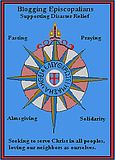Imagining the Messiah, part 2
I'm continuing to post the notes from the St. Paul's Cathedral ECW Quiet Day from last week. This is the second in the series of meditations I gave. Again, some are notes rather than complete sentences. The Anchor Bible Dictionary was most helpful on the topic of Messiah(I discovered this poem in seminary and was pleased to be able to find it so easily on the web last week. I opened the second meditation with it. Until last week, I didn't know there was a companion poem, called "Nativity").
Annunciation (John Donne)
Salvation to all that will is nigh;
That All, which always is all everywhere,
Which cannot sin, and yet all sins must bear,
Which cannot die, yet cannot choose but die,
Lo, faithful virgin, yields himself to lie
In prison, in thy womb; and though He there
Can take no sin, or thou give, yet He will wear,
Taken from thence, flesh, which death's force may try.
Ere by the spheres time was created, thou
Wast in His mind, who is thy Son and Brother;
Whom thou conceivst, conceived; yea thou art now
Thy Maker's maker, and thy Father's mother;
Thou hast light in dark, and shutst in little room,
Immensity cloistered in thy dear womb.
Matthew 3:1-12
Read twice. During the second reading, imagine yourself in the scene with the crowd and John the Baptist. Who are you? Are you in the crowd? Are you John? What are you wearing? What does it look like? What does it sound like? What do you smell? What do you taste? What do John's words means to you? Who are you expecting? When you think of the Messiah, who are you imagining?
Messiah. From the Greek messias, a form of the Hebrew masiah (note--forgive any misspellings)--an anointed person.
In Scripture, who gets anointed? Kings. Think of the scenes in 1 Samuel--Saul, David. Kings are anointed by the initiative of Yahweh--divine election and commission.
Priests are anointed, especially in the P section of Torah.
Prophets--not anointed in the strict sense, but certainly call scenes have anointing like moments--the coal touching the prophet's lips, Elisha picking up Elijah's mantle.
Hebrew Scriptures don't necessarily contain an image of one person to come and be God's instrument of righting the world. Christian writers combed them, looking for an understanding of the events that surrounded Jesus' life and death. But certainly there was an expectation of God's action in the future, of someone anointed in the David dynasty, of a future high priest and of a righteous king.
Jesus does enact all the roles of an anointed one. Matthew and Luke carefully connect Jesus to Bethlehem, and to connect him to the genealogy of David. Jesus acts in priestly ways, declaring things clean and unclean, and interpreters see him as the great High Priest. Jesus also takes on the role of prophet.
I have this idea, that the Spirit, not being bounded by time and space as we are, dropped hints in the mids of those who wrote Hebrew Scriptures, to use certain language and themes, and then whispered into the ears of the Gospelers to find them and expand upon them.
In fact, the Gospelers and other New Testament authors showed that they could use Hebrew writings imaginatively, taking out of them new ideas, purposes for which they were not originally intended, even changing words and phrases to suit their own purpose. It's hard for me to be 'literal' interpreter of the Bible when I know the Gospel authors didn't perfectly copy the Scriptures they use to "fulfill the prophecy." So I think we could all use a lighter and more imaginative approach to Scripture.
Jesus as Messiah comes to us directly from God's imagination. Who could have imagined a Messiah, an anointed one, being fully human and fully divine? What kind of Messiah would be born among a family that included a woman pregnant before marriage and a carpenter? Surely a Messiah, a royal anointed one, would be born among kings, in a comfortable house, educated by the best scholars, and cared for by the best nannies the ancient world could offer.
God's imagination keeps turning the whole program upside down. People in Jesus' time were hoping for a great leader to help them. They were hoping for a military intervention to get rid of the Romans. Or someone who would say "this is right and this is wrong," hoping of course, to confirm that they were already right.
Instead, we have a baby, who spends some time as a smart aleck adolescent (Mom, Dad, you should have KNOWN where I was). Then he allows himself to be baptized, even though your real Messiah should have been the one doing the baptizing. Then he starts wandering around Galilee instead of Judea--Galilee, home of people whose faith and ancestral origin were uncertain, and not exactly the center of power.
This Messiah isn't doing real world expectations. He didn't go to prep school and Harvard, he wasn't the star quarterback, he's not making any commercials--in fact, in the Gospel of Mark, he tells people to keep what he does a secret. He doesn't always follow the Law the way people think that he should, and he thinks he has the authority to forgive sins the way God does.
He spends all day dealing with those who get left out and left behind. Women, demoniacs, lepers.
He doesn't get a book deal with movie rights and an invitation to Herod's court. He gets himself crucified.
The Gospels are all trying to answer the question, how can he be the Messiah, and die in such a humiliating manner?
Is this the Messiah of your imagination?
What are you hoping for? What are you longing for? Where is your spiritual hunger? This Advent, where does your inagination need to stretch to make room for this kind of Messiah?

























0 Comments:
Post a Comment
<< Home